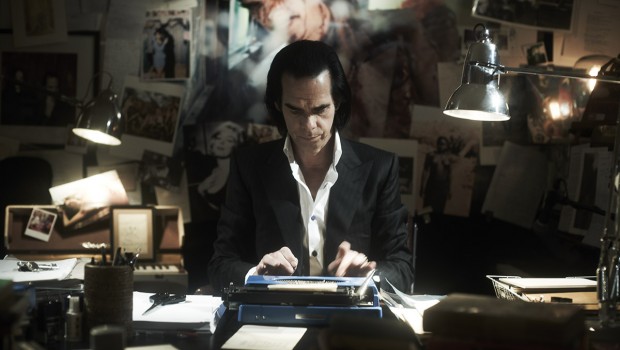20,000 Days on Earth – Film Review
Reviewed by Damien Straker on August 18th, 2014
Madman Entertainment presents a film by Iain Forsyth and Jane Pollard
Produced by Dan Bowen and Alex Dunnett and James Wilson
Written by Iain Forsyth, Jane Pollard and Nick Cave
Music by Nick Cave and Warren Ellis
Cinematography: Erik Wilson
Edited by Jonathan Amos
Running Time: 95 mins
Rating: MA15+
Release Date: August 21st, 2014
This pseudo documentary about a fictional day in the life of musician and author Nick Cave is a windbag of a film made for fans and the subject himself only. As a non-fan I came out of the film not wiser about Nick Cave and not as in awe of music as the filmmakers would expect of me. At the very least, the film’s concept deserves credit for attempting to reshape the documentary format into a cinematic concept. It recalls the way that Todd Haynes dramatised Bob Dylan’s whole career, poetics and artistry in the film I’m Not There. These films remind us of the essence of cinema which is to create artificial memories and imagined time and space. Cinema also shares symmetry with dreaming because of the artificiality of what is created and what is experienced and seen. 20,000 Days adheres to this cinematic quality by blending real people with fictional spaces and time. It is purposely a made-up representation of Cave’s twenty-thousandth day on Earth. The aim of the film is to combine drama and reality to show Cave’s own artistic process. The directors Iain Forsyth and Jane Pollard said they wanted to portray the Nick Cave that tells stories and demonstrate both the importance of art and creativity and the relationship between an artifice and a truth. Yet their aims are limited to telling us what we already know about Cave’s broad range of skills. Nick Cave’s reputation stands glowingly without a documentary reiterating his creativity. His music for the band Nick Cave and the Bad Seeds has a sizeable following and that he has co-written film scripts for the well-regarded Australian film The Proposition and the Hollywood thriller Lawless. These two films were violent but they didn’t exhibit some of Cave’s currently visible pretensions. One example is his voice over, which supplies the film with florid prose more suited to a novel, including ruminations about being a cannibal or talking about contrasting images like Mongolians, clowns and children.
On top of laborious and overlong rehearsal scenes, the main pillar for this film is the imagined spaces filled with real people. A number of famous people throughout Cave’s career like Ray Winstone and Kylie Minogue appear beside him in his car showing how he is hallucinating or daydreaming. Less successful are the self-indulgent moments that attempt to intellectualise the aura of the singer, like Cave talking to British psychoanalyst Darian Leader. They apparently spoke for two days for over ten hours. Extracted from the discussion are some immensely boring conversations about how Cave’s father read the first page of Lolita to him as a child so he would understand the power of the author’s prose. The interview is meant to represent Cave’s desire to preserve his memories. It is a gift to him from the filmmakers to record and store his experiences. In the end, who cares when this preservation is only important to one person? As much as the film goes to great lengths to stress Cave’s creativity and imagination the direction employed is static at crucial times. The discussions with Leader are framed with simple reserve shots while they sit in chairs opposite each other, thereby reducing the film’s scale to that of a television style interview. Another episode suffers from the same lethargy. One of the fictional spaces in the film is Brighton Town Hall where the filmmakers decided to take items from the Nick Cave Collection in Melbourne and re-imagine the space overseas. I found these scenes dull especially in the microscopic examination of Cave’s photos from his childhood as well as a pointless discussion about a photograph of someone urinating on a stage. The feel of the documentary is one of self-importance as it tries very hard to reach a philosophical outlook about memories. It is an attempt to try and reshape the documentary format but with slow pacing and a reduced cinematic style of shooting this might only be interesting to hardcore fans or as a documentary found on television. If you ever wanted to learn more about Nick Cave’s weather diary, this is your lucky day. I struggled to find a reason to care.
Summary: If you ever wanted to learn more about Nick Cave's weather diary, this is your lucky day. I struggled to find a reason to care.







